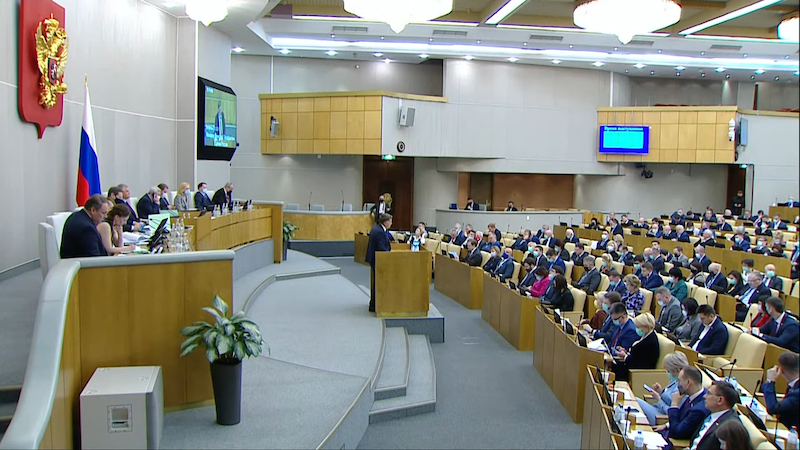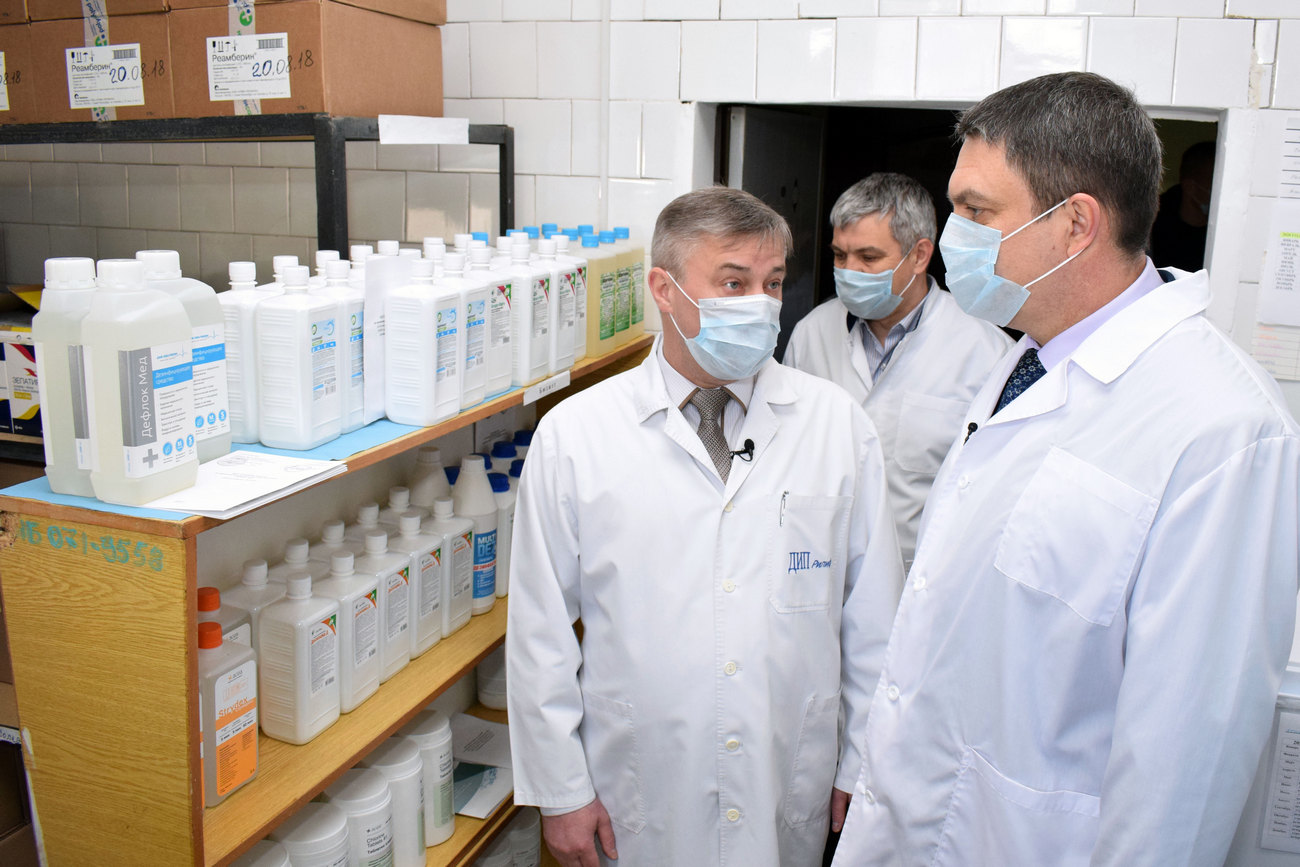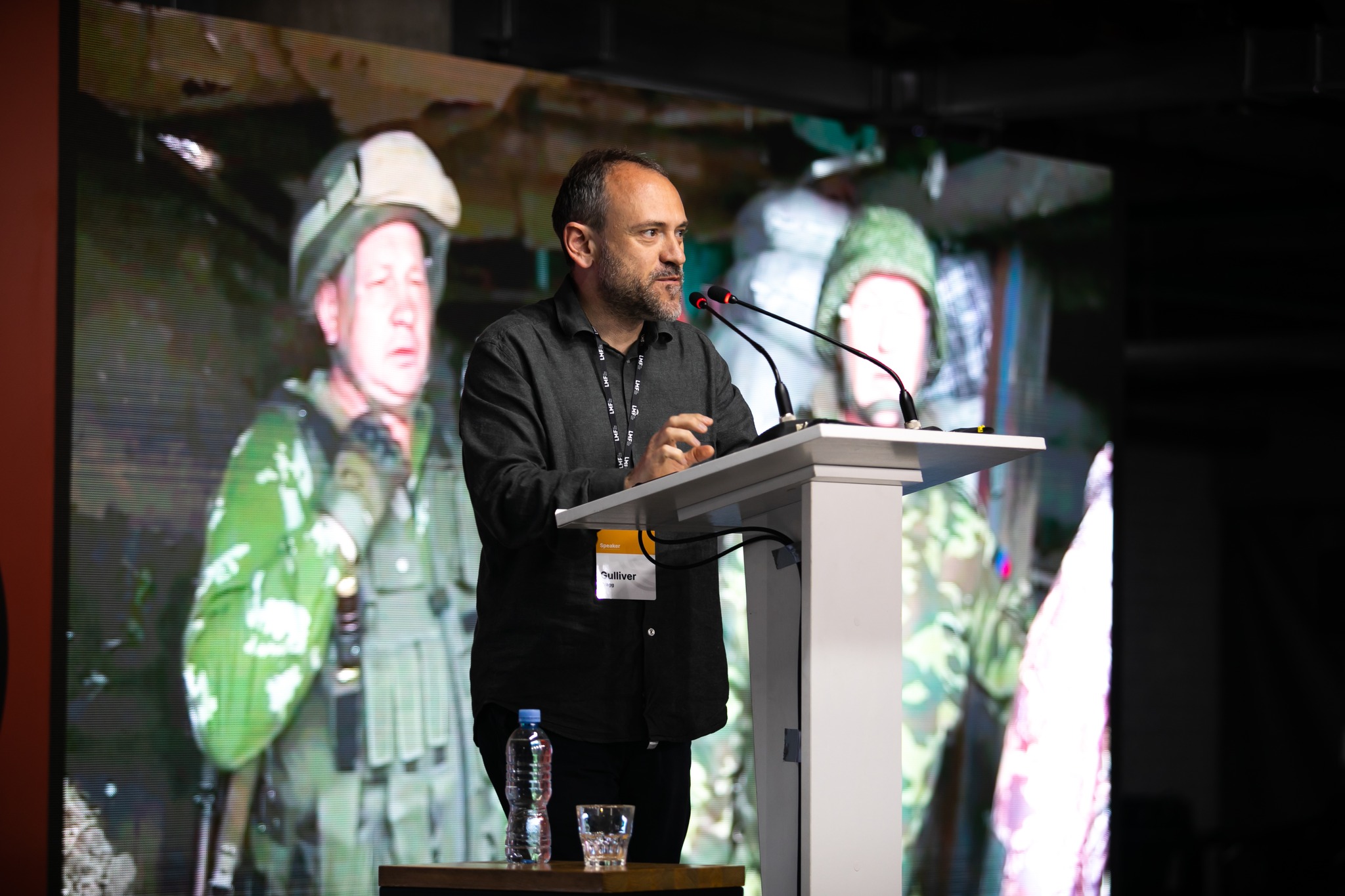The State Duma - the lower chamber of the Russian parliament - has voted to pass a motion calling upon Russian President Vladimir Putin to consider the need to recognize the "Donetsk People's Republic and the Luhansk People's Republic" ("DNR" and "LNR") as "self-sustained, sovereign and independent states," according to the Duma's chairman Vyacheslav Volodin.
The mentioned "republics" are Russian-run entities playing the role of de-facto Russian occupation administrations in parts of Luhansk and Donetsk oblasts of Ukraine.
Hours before the voting in the Duma, the Verkhovna Rada -- Ukrainian Parliament -- adopted a resolution that approved an address urging international structures, and national governments and parliaments not to recognize the "independence of illegal entities in the temporarily occupied territories of certain areas of the Donetsk and Luhansk oblasts."
According to the Duma's press release, Russian MPs believe that recognizing the "LNR/DNR" will
"create grounds for ensuring security guarantees and protection of the inhabitants of the republics from external threats, as well as for strengthening international peace and regional stability in accordance with the purposes and principles of the UN Charter, and will initiate the process of international recognition of both states."
The mentioned UN Charter of 1945 recognizes the right of all peoples to self-determination, which is problematic as there are no specific peoples in Luhansk and Donetsk oblasts different from the rest of the Ukrainian population.
Meanwhile, the Rada's address strongly condemns any attempts by the Russian Federation to recognize or legalize the independence of the "self-proclaimed entities," which "constitute the occupation administration of the Russian Federation, established by it in the temporarily occupied territories of Donetsk and Luhansk oblasts of Ukraine."
Russian Duma urges Putin to recognize Donbas puppet "republics"
According to Russian media, the Duma had two versions of the draft address to call on Putin to recognize "LNR/DNR" as independent states. One bill was drafted by the Communist Party of Russia, another by Putin's United Russia.
The Duma adopted, as BBC Russia put it, the "harsher" bill by the Communists. The only major difference between the two was that United Russia's draft resolution called on Putin to recognize the sham "republics,"
"but [only] after consultations with the Ministry of Foreign Affairs on the subject of compliance with international agreements, including the Minsk agreements," according to TASS.
The Duma's press release shows that the resolution reiterates major anti-Ukrainian narratives disseminated by the Russian state propaganda machine for years,
- it says that "DNR and LNR residents" have been under fire for eight years, that Ukraine stopped paying pensions and imposed a "complete economic blockade" of the population and enterprises in the territories, conveniently omitting the only reason for the conflict to emerge and persist -- the ongoing Russian aggression and occupation in the east of Ukraine;
- Moreover, the document states that “The actions of the Ukrainian authorities are quite comparable with a genocide of their own people," a recurrent accusation unsubstantiated by any evidence.
- The MPs consider the recognition of the puppet states "well-grounded and morally justified," stating that over the years, "based on popular will, democratic bodies and states with all the attributes of legitimate power have been built in the republics," omitting the fact that no real state has recognized either of the statelets, any of the so-called elections in them, or even any member of the occupation administrations as legitimate.
Ukrainian parliament's address
The Verkhovna Rada's address appeals to the UN, the European Commission and Parliament, the parliamentary assemblies of the Council of Europe, the OSCE, and NATO, the world's governments and parliaments.
The Ukrainian parliament urges the addressees
- to confirm the territorial integrity of Ukraine and its inviolability within internationally recognized borders;
- not to recognize any Russian decisions related to the recognition of the independence of the Russian-occupied areas;
- to condemn strongly any Russian actions directed towards "aggravating the security situation in the world in general, and in Ukraine in particular";
- consider the issue of legal grounds for Russia's permanent membership in the UN's Security Council, and convene an urgent meeting of the UNSC regarding the "conflict escalation on Ukraine's borders," and impose additional sanctions on Russia to "prevent further escalation."
Russia's cookie-cutter recognitions of independence
Previously, there has been a precedent of Russia's recognition of Russia-controlled foreign territories as independent states. In late August 2008, days after the end of the Russo-Georgian war, the Duma passed similar motions urging then Russian president Dmitry Medvedev to recognize two Georgian regions, Abkhazia and South Ossetia, as sovereign states.
- Read also: How the Russo-Georgian War of 2008 Started
Three days later Medvedev signed the relevant decrees, citing the same UN Charter and several other basic documents of international law.
He justified his decision as based on "the situation on the ground" and "the freely expressed will of the Ossetian and Abkhaz peoples," with arguments identical to the Duma's motion to Putin.
Currently, Georgia and the West uphold their policies of non-recognition of the Russian-occupied regions of Georgia. Abkhazian and South-Ossetian independence has been recognized only by Russia, Nicaragua, Venezuela, Nauru, and Syria. Vanuatu and Tuvalu once recognized Abkhazian sovereignty but withdrew their recognition later.
Russia enjoys de-facto full control of the Georgian territories in a similar way that it rules over Donetsk and Luhansk. All these four Russian-occupied self-proclaimed "states"
- use the Russian ruble as their currency;
- have totally devastated economies heavily dependent on Russian subsidies and imports;
- have Russian passports mass distributed among their populations;
- have a heavy Russian military presence;
- and remain the Kremlin's puppet states with local rulers having some say in local issues while being under the Kremlin's control.
The only major difference between the Russian-recognized Georgian regions and not-yet-recognized "LNR/DNR" is that in Abkhazia and South Ossetia, the Russian government bodies openly interact with local de-facto governments, while the official contacts with the occupation administrations of Donetsk and Luhansk are purely humanitarian. Meanwhile, the Kremlin oversees the affairs in the territories as the Russian military and FSB secret police control security there.
Minsk Deal vs Russia's recognition of "LDNR" independence
The Minsk accords signed in fall 2014 and winter 2015 were meant to be a roadmap to resolve the conflict in Luhansk and Donetsk oblasts historically referred to as the Donbas. Official Ukraine and the West consistently repeat that the deal is the only way out of the crisis.
Under the accords, the non-government-controlled parts of Donetsk and Luhansk oblasts should eventually return to Ukrainian sovereignty after the implementation of a number of paragraphs.
However, the implementation of the accords has been in a stalemate since its documents were signed since they contain paragraphs impossible to implement for both Ukraine and Russia. Moreover, Russia insists it is not a party to the deal, insisting that Ukraine should negotiate directly with "Donetsk and Luhansk authorities."
That is why on 25 January, Ukrainian Defense Minister Oleksiy Reznikov said that he believes that Russia's recognition of "LNR/DNR"
"will be an obvious step for Russia to withdraw from the Minsk agreements, a demonstration that they are essentially abandoning the Minsk agreements, which, although not an act of international legal nature, are political and diplomatic agreements that have even been agreed by the UN Security Council."
Now, NATO Secretary-General Jens Stoltenberg said addressing a journalist's question at a briefing on 15 February,
"On the question of Russian recognition of the so-called "people's republics" of Donetsk and Luhansk: in that happens, that would be a blatant violation of Ukraine's territorial integrity and sovereignty once again. Because there is no doubt that Donetsk and Luhansk [are] part of Ukraine within internationally recognized borders... it will also be a violation of the Minsk agreements, so it will make it even harder to find a political solution based on the Minsk agreements."
Meanwhile, Russian officials disagree.
Russian MP Leonid Slutsky, Chairman of the Duma Committee on Foreign Affairs, believes that the Duma’s motion to Putin will not entail changes to the Minsk accords,
“I don’t think that because of this, Minsk-2 will be revised, although this is what probably what official Kyiv and Kyiv's Western tutors would call for,” Slutsky said to Interfax.
Back in 2018, Russian FM Sergei Lavrov assured that Russia's recognition of the "DNR" and "LNR" would be a deviation from the Minsk agreements, but Russia, according to him, "always keeps and fulfills its word."
Meanwhile, Viktor Vodolatsky, one of the authors of United Russia's draft motion which wasn't adopted, told TASS that the adopted Communists' motion would anyway be redirected from Putin's administration to the General Legal Department and the to the Ministry of Foreign Affairs.
Lavrov's 2018 statement made Russian political expert Dmitry Oreshkin believe that Russia is going to bury the motion in bureaucratic procedures,
"This means that the attempt to intimidate Ukraine and the West with a concentration of armed forces has not paid off, and now we turn to an attempt to intimidate by appending [the "LDNR"]. But no one will rush to do the appending, just as in the case of the concentration of armed forces," Oreshkin commented to Current Time.
However, back in 2008, it took the Russian president only three days to recognize the independence of two Georgian regions after the Duma's motion, which shows that Russian bureaucracy isn't necessarily an obstacle to the recognition of two Russian puppet states in Ukraine.
Update Feb. 16: US Secretary of State Antony Blinken has called Russia's possible recognition of "LDNR" independence a "wholesale rejection" of Russia's Minsk commitments:
"Kremlin approval of this appeal would amount to the Russian government's wholesale rejection of its commitments under the Minsk agreements," says @SecBlinken of Duma resolution on eastern Ukraine https://t.co/E8QjXe1nG4 via @W7VOA pic.twitter.com/sBTeEsqIb9
— Liveuamap (@Liveuamap) February 16, 2022
Further reading:
- Three-fourths of Ukrainians oppose Minsk accords in current form, poll shows
- Everything you wanted to know about the Minsk peace deal, but were afraid to ask
- The Russian war against Georgia is far from over
- Ten years after: why Georgia failed to reintegrate its occupied territories
- Conflict conservation in Ukraine’s east follows the Transnistria model
- How Ukraine can escape the trap of the Minsk Protocols and return to international law
- Ukraine-Russia peace talks are in a stalemate as Kyiv eyes ways to revise Minsk deal (2020)
- What would happen if Ukraine implements the controversial Steinmeier formula for Donbas?
- Policy shift shows Russia preparing to recognize its puppet republics in Donbas (2017)
- The Kremlin's five steps towards recognizing “DNR/LNR” (2017)
- Russia wants to acknowledge the 'DNR' and 'LNR' elections (2014)
- Russia’s triple strategy of proxy war used against Georgia in 1920 and now





